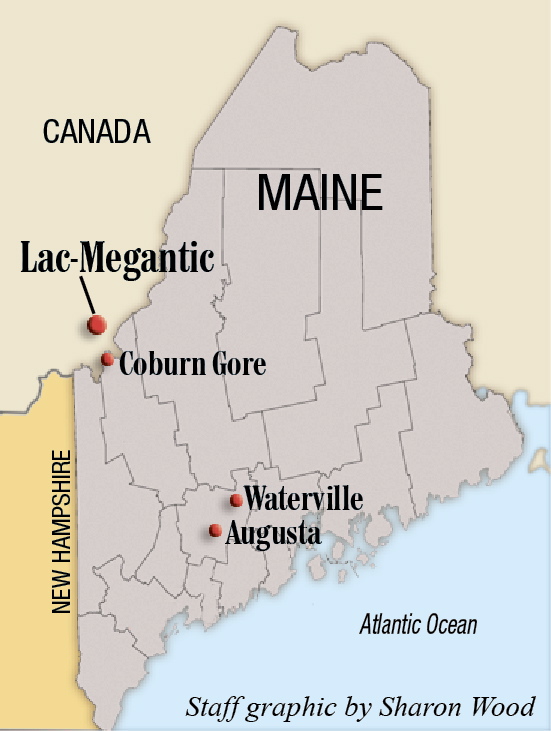WATERVILLE — On Sunday morning, one year after a tragic train derailment killed 47 people in Lac-Megantic, Quebec — slightly more than100 miles from here — residents and activists will gather on the lawn of the Universalist Unitarian Church to remember the victims.
They will plant 47 sunflowers in downtown Waterville — one for each person who died in the explosion, which hit the small Canadian town around 1 a.m. July 6, 2013.
The observance also will serve to call on elected officials to take a stand against the transportation of crude oil by railroad — a practice not only on lines such as the railroad that runs through Lac Megantic, but also on lines that run through Fairfield, Oakland and Waterville.
“This is very relevant for families here in central Maine, because the railroad lines that run through our downtowns are carrying the same explosives that destroyed Lac-Megantic,” said Waterville resident Richard Thomas, co-organizer of Sunday’s memorial. “We need to do more than simply honor the victims of the train explosion. We need to bring our requests for safer railroads to the president, to our governor and our town managers.”
The memorial observance in Waterville is scheduled for 11 a.m. Sunday on the lawn of the Universalist Unitarian Church. It is also part of an Oil by Rail Week of Action being sponsored by several environmental groups that will hold observances this week in more than 50 places across the U.S. and Canada.
In the wake of the disaster, environmentalists and community and civic leaders in Maine have expressed concern about the risks involved in transporting crude oil by rail.
“Lac Megantic is a prime example of a much deeper problem, which is that the rail industry seems to be most concerned about meeting their goals and less concerned about the safety of people in communities and is taking pretty rash risks with the safety of the communities that they travel through,” said David Stember, a campaign organizer for 350.org, a nonprofit group that advocates against climate change and is one of the four groups behind the Oil by Rail Week of Action.
The others include ForestEthics, the Sierra Club and Oil Change International.
In nearby Oakland, where several miles of railroad that historically have carried crude oil cut through downtown, the Town Council raised concerns about the railroad’s safety in April 2013, prompting an evaluation of what the response would be if a car were to derail and spill into Messalonskee Lake, Town Manager Peter Nielsen said.
“Then in July, when the disaster occurred, we realized that the larger problem was explosions and burning in addition to an overturn, as serious as that might be,” said Nielsen, who is also president of the Maine Municipal Association, a nonprofit organization that assists municipal governments in serving citizens in Maine.
Nielsen and other Maine officials traveled to Lac-Megantic in December to meet with Canadian officials and collaborate on improved safety mechanisms for trains traveling back and forth between the borders.
The Maine Municipal Association and its counterpart in Quebec, the Union of Quebec Municipalities, have traveled to both Montreal and Washington, D.C., to meet with federal government officials.
Nielsen said there have been some improvements in the year since the Lac-Megantic disaster. There are now limits on the number of cars and the amount of crude oil that can be transported, and more information has become available on what is being transported and when the trains make their Lac-Megantic trips.
The Maine Department of Environmental Protection has made data available on how much crude is moved through the state, but it is available only after the oil is moved.
“Oakland is not alone. People who live in towns and cities across Maine have the right to expect this product to be moved safely,” Nielsen said. “There may be people who are more interested in the topic of fossil fuels, but my interest is in the safe movement of this product through our communities.”
Since Lac-Megantic, there have been explosive derailments in Alabama; Lynchburg, Va.; South Dakota and New Brunswick. Crude shipments in Maine resumed in March following the explosion and the subsequent bankruptcy of the Montreal, Maine & Atlantic Railroad, the line on which the explosion occurred.
In May the Maine Municipal Association sent a letter to President Barack Obama asking for greater restrictions on tank car safety and calling for a ban on a model known as the DOT-111. A number of improvements still need to be made, and the retrofitting of the cars is chief among them, said Nielsen.
More importantly, increasing transparency about what is being transported will provide communities with a better idea of their exposure to risk, Stember said.
“Ultimately, this week is about showing that communities care,” Stember said. “This is really a community-based concern. There are national concerns and global issues around climate change, but it shows up in the safety and well-being of our communities. Communities don’t want this. They are concerned.”
In Maine, residents and activists plan to gather in six places around the state, including Waterville. They will share pictures and read names of the victims.
In Waterville, a song by Jay-based songwriter Ruth Hill, called “Lac-Megantic,” will be performed at the memorial, telling the story of a Canadian woman who lost her sister in the explosion.
“I just couldn’t get the images from the news out of my head. I researched it and just spent about a week reading every article I could find about it and wrote it,” said Hill, who won’t be able to attend the memorial but has given permission for the song to be played Sunday.
Rachel Ohm — 612-2368
Send questions/comments to the editors.




